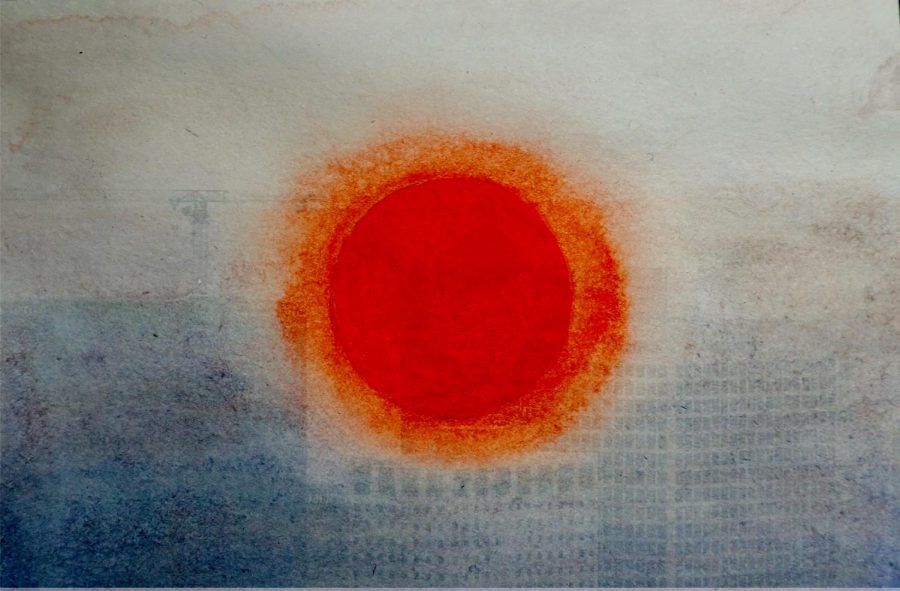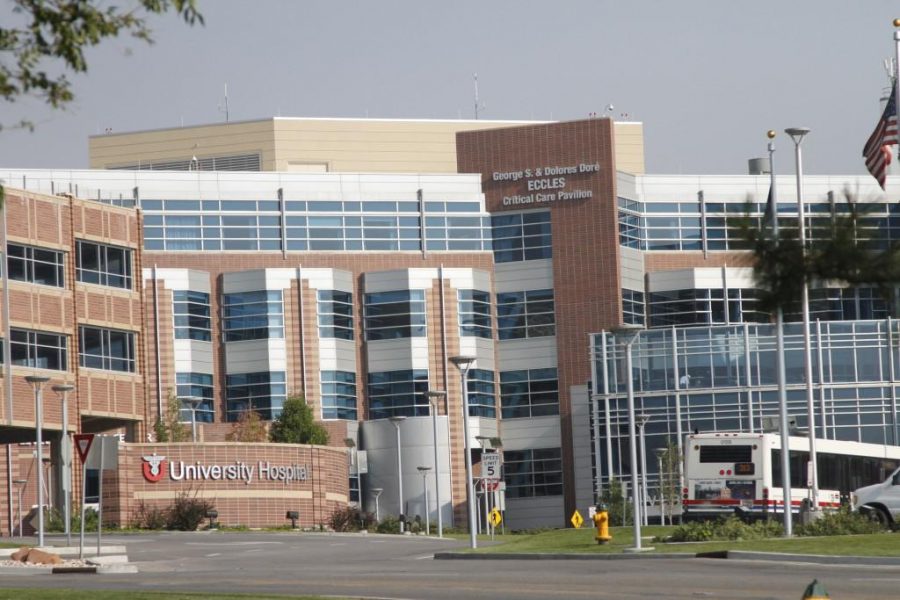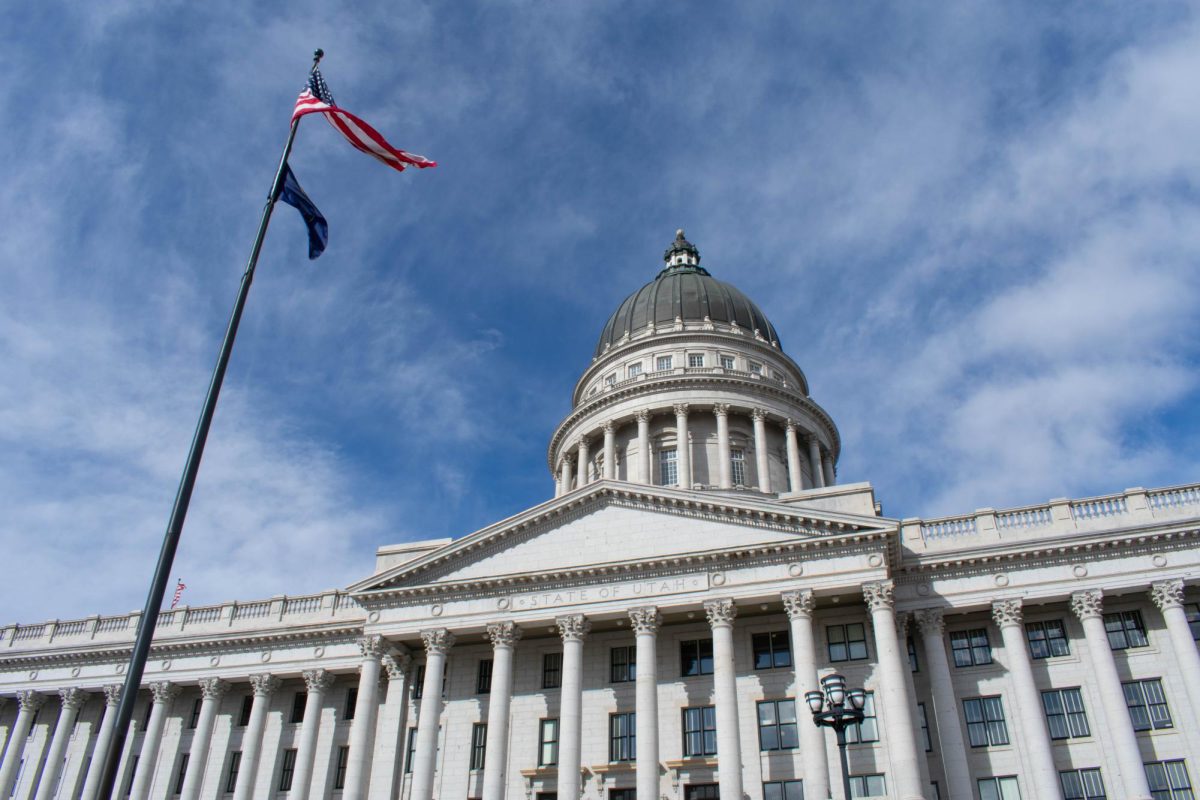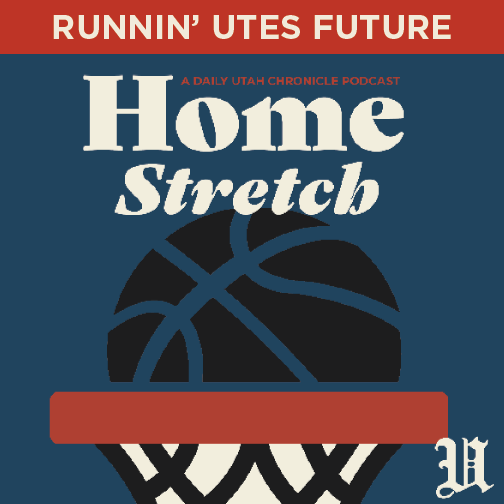Soter: Dear Local Officials, Save Utah’s Air
(Graphic by Cyan Larson | The Daily Utah Chronicle)
August 19, 2021
I have lived in Salt Lake City for 19 years, but I’ve never experienced worse air quality than during the first week of August 2021. When I opened my window, I thought my neighbors just lit the BBQ. I couldn’t see the mountains, no matter where I stood, and a few moments outside burned my eyes.
We deserve better air quality. Our local officials are looking at us citizens to do more, but we should be looking at them. Individual citizens making more mindful decisions to reduce air pollution has an impact, but the last year and a half has proven that it cannot be the expectation.
The state’s rising number of COVID-19 cases and deaths can only be blamed on those who refuse vaccinations and mask recommendations. This disheartening reality makes it clear that I can’t count on my fellow Utahns to make the right choices in terms of health, air or any other societal issue. It is time that local officials step in and enact legislation that will force citizens to do more.
The air quality index (AQI) measures air pollution worldwide. It communicates the severity of air pollutants to the public. AQI is measured on a scale from 0 to 500 with 300 being the threshold for dangerous air to breathe. The more pollutants that are emitted in and around the state, the higher the AQI.
On Aug. 6, 2021, Utah had the highest AQI worldwide. Throughout that week, Utah’s AQI remained one of the highest in not only the country but the world. This poor air quality is mainly the result of the wildfires on the west coast that have been catalyzed by the extreme drought that is plaguing the west coast.
The Dixie fire is the largest fire the state of California has ever seen and has incinerated 463,000 acres so far. California’s smoke blew towards the east where Utah’s mountains trapped it.
UCAIR (Utah Clean Air) is a statewide senior partnership that aims to educate, fundraise and unite the community in the battle against air pollution. When I talked to Kim Frost, the executive director of UCAIR, she clearly explained Utah’s unique relationship with poor air quality.
Frost said that extreme droughts and apocalyptic wildfires are not wholly responsible for the horrid air conditions Utahns experience nearly all year long. “It is a geography issue,” she said. “We can see winter inversion because we are in a valley. When we have a cold front move in and warmer air moves over the top of that, it creates a lid.”
Frost explained that summer air conditions are different. “Aside from the wildfire issues that we’ve been having, we also have summer ozone,” she said. “When emissions and pollution start to rise, because of the heat, they get trapped. We ask people not to throw up their hands and say, ‘Oh well, it’s the wildfires. There’s nothing we can do.’ We are still in the summer ozone season. We need people to remember that they’re still part of the solution and that we have to take measures to be mindful of how we can help clear the air.”
As for the fall and spring months, Frost said that the valley sees “a clearing”, but only for a short time. Which is why UCAIR asks “people to be mindful of their pollution and the effect that it has on the valley” during all months.
Frost and Elizabeth Joy (chair of UCAIR) recently published a letter in The Salt Lake Tribune. Their Op-Ed urges Utahns to combat the drought-induced wildfires and air pollution by following the water conservation suggestions made by the governments’ slow the flow campaign, along with other seemingly benign solutions that will make minor changes, not the massive ones that the state needs.
When I asked Frost about her piece having an unfiltered emphasis on individual action as opposed to community action, her response was to the point. “At UCAIR we really try to focus on what the public can do to help clear our air.” Frost gave well-grounded examples of things the public can and should be doing to reduce air pollution. “The emissions that come out of our cars, are a major source of pollution for us in the state. So, we really ask citizens to drive in carpools and to think about taking public transit.”
While Frost and the rest of UCAIRs’ individual asks are well-intended, people will continue doing what they want to do, unless they are forced to do otherwise. This is where local officials must come in and must enact strict legislation that will ensure air pollution in the state of Utah is reduced.
I love my state. It is my home. When smoke is not in the way and you are able to see three feet ahead of you, there is beauty wherever you look. It is up to Utah’s local leaders to honor that beauty and force, not ask, citizens to do more to keep our air clean.













John Hedberg • Aug 24, 2021 at 8:59 pm
“The state’s rising number of COVID-19 cases and deaths can only be blamed on those who refuse vaccinations and mask recommendations. This disheartening reality makes it clear that I can’t count on my fellow Utahns to make the right choices in terms of health, air or any other societal issue. It is time that local officials step in and enact legislation that will force citizens to do more.”
According to the Utah Coronavirus website (under Risk Factors), there have been nearly 8800 breakthrough cases of COVID-19 in Utah among those who’ve already been vaccinated, including 499 hospitalizations and 42 deaths: among the vaccinated! (as of 24 August) According to the same official website (under Vaccines), the groups with the lowest vaccination rates have been African Americans (37.4%), Pacific Islanders (36.9%), and Native Americans (34.2%). Before you “force” these equal citizens to get a shot they’ve evidently decided they have more to fear from than COVID, has anyone ASKED ANY OF THEM THE REASON they’re so vaccine-hesitant? (wink-wink: a journalist might)
https://coronavirus.utah.gov/case-counts/
Then, there’s your opinion about what “the right choices” are for other people. According to WHO and CDC statistics, for people under 40, COVID is less dangerous than the seasonal flu. You can look up those statistics online and verify. So, when was the last time the government “forced” people to wear masks and get barely-tested vaccine shots for flu season? If you’re under 40, and have read history, you might worry about the fact that these vaccines haven’t been around long enough for us to know how they affect people long-term. They’ve been in use less than a year, so that long-term clinical data simply hasn’t had time to aggregate yet. For some people, risking 3 days of flu symptoms from COVID doesn’t seem like a big risk. I’ve heard people talk especially about the unknown effect on fertility. There’s been no time for data yet.
Finally, what limits do you think “local officials” should have in what they “force” your equal brothers and sisters to do in the name of public safety? What if “officials” decided that the only way to win the fight against climate change was mandatory sterilization, Tuskegee style? Would your fellow Utahns be able to count on you to make “the right choices” in the face of their climate fear? What if “officials” tried to force you to?
Higher CO2 levels mean plants are a lot happier and grow more abundantly, and warming global temperatures mean that the vast permafrost lands in the Arctic are slowly turning green, producing more O2 from CO2. Sustainable development is certainly vital to prevent loss of species and habitat, not to mention better forest management to prevent wildfires, and we can certainly do much more to clean up after ourselves as a species, but is global warming and the greening of the Great North really enough of an emergency for you to let “officials” force you to follow THEIR orders about YOUR body?
All the Best, With Love!
J Hedberg